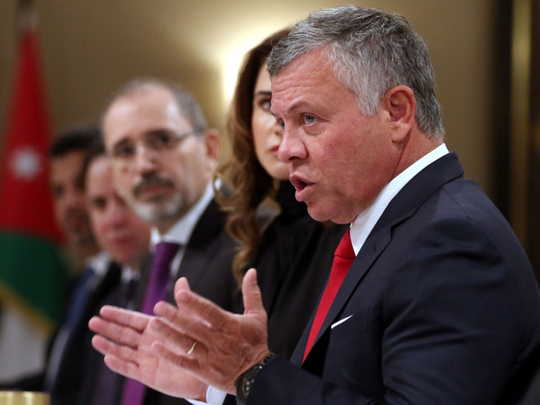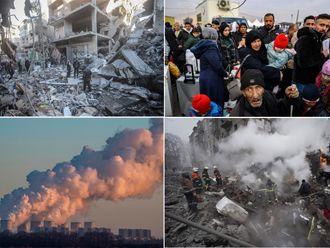
Let’s give Jordanian diplomacy a well-deserved applause as the Kingdom muzzled out a “sorrow” and “regrets” apology from Israel for its heinous act of the killing of two of its citizens last July in an apartment on the Israeli Embassy compound in Amman. While it is incredible to believe an embassy security guard could shoot two people to death and go ‘scot-free’ and travel back to Israel under diplomatic immunity, Jordan acted prudently, carefully and with patience, forcing the Jewish state to issue a “packaged memorandum” of financial compensation, reopening the file of the guard with possible prosecution and insistence on changing Israel’s Ambassador to Amman as a precondition for diplomatic normalisation between the two states.
Jordan stood firm this time around after the last criminal acts were carried out, maintaining a rock-solid position that either the Israeli Embassy stays effectively paralysed or real action needs to be taken. This was particularly in the light of the fact that the Israeli government dragged its feet after the killing of Jordanian judge Raed Zeiter by an Israeli soldier while crossing the Jordan River in March 2014. With last July’s killings in the heart of Amman, Jordan set a process to make sure that Israel would bend and the chickens were going to come home to roost. It thus set up extensive channels of communication to make sure that Jordan would do its utmost to make sure justice was done. After the bloody incident, the Israeli government swiftly packed the embassy staff off and sent them back to Tel Aviv, triggering the worst diplomatic crisis between the two countries since they signed a peace agreement in 1994.
Jordan made it clear there would be no diplomatic turnaround unless Israel took cognizance of the cold-bloodied murders. This in turn forced the Foreign Ministry in Tel Aviv to issue an “apology memorandum” that was seconded by Prime Minister Benjamin Netanyahu. Israel had continued to receive “black-out” vibes from Jordan that “normality in relations” would continue to be frozen and no exchange of ambassadors would take place unless the crimes — shooting of 17-year-old carpenter Mohammad Jawawdeh and well-known surgeon Dr Bashar Hamarneh in an apartment rented to the Israeli guard — was dealt through proper legal channels and not swept under the carpet.
Initially, there was a clear attempt at whitewashing the issue by Israel, which particularly irked Jordan, forcing it to step up the diplomatic pressure through sustained messages to the Israeli government that Amman would not just stand by and let Israel get away with murder. Jordan’s anger was heightened when it saw guard Ziv Moyal being met by Netanyahu, hugging him and praising him for his actions in a video released by the staff of the prime minister.
According to Israeli sources, the Israeli guard was angered by the late delivery of furniture. A war of words ensued with Jawawdeh allegedly trying to stab the guard with a screwdriver. Regardless of the heated arguments and what actually went on, the guard, Ziv, should not have overreacted and gone on a “shooting spree” that also led to the death of Dr Hamarneh, an innocent bystander from whom the flat had been rented.
The gruesome incident was a deja vu for Jordan, as “we have been down that road before” when Mossad agents attempted to assassinate Hamas leader Khalid Mesha’al on the streets of Amman in the late 1990s. If it hadn’t been for the insistence of the late King Hussain, who called Netanyahu to provide the antidote for the deadly poison that had been administered on Mesha’al, the Hamas leader would have died.
In a way it was like history repeating itself again this time around. King Abdullah took the lead in the affair and Jordan insisted that if normalisation of ties was to continue, then the July 23 crime and the one before would have to be dealt with effectively and Israel would have to stop meddling in its affairs. By the latest “apology memo”, Israel has effectively acquiesced to the fact that Jordan is nobody’s backyard and no one, including Israel, can just trample on its lands and target its citizens without legal consequences.
What may have helped achieve this latest diplomatic breakthrough between Jordan and Israel is the fact that Tel Aviv had long sought to contextualise itself in the international community, pandering not only to its traditional allies — the United States and Europe — but also to the United Nations, Africa and some Asian countries like India. But this time around, Netanyahu may have been persuaded to follow a conciliatory approach with Jordan because the killings had already been given an international media spin, showing them to have violated all norms of justice and human values. This scuttled Israeli moves at an image makeover.
Marwan Asmar is a commentator based in Amman. He has long worked in journalism and has a PhD in Political Science from Leeds University in the UK.



_resources1_16a45059ca3_small.jpg)





